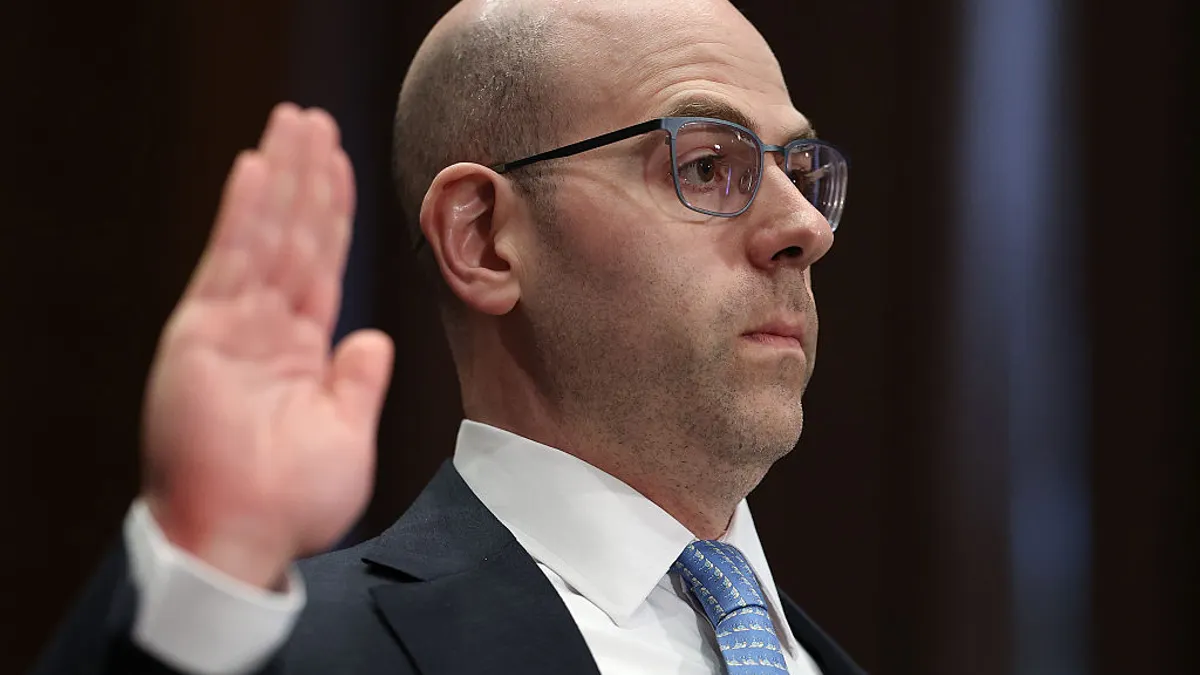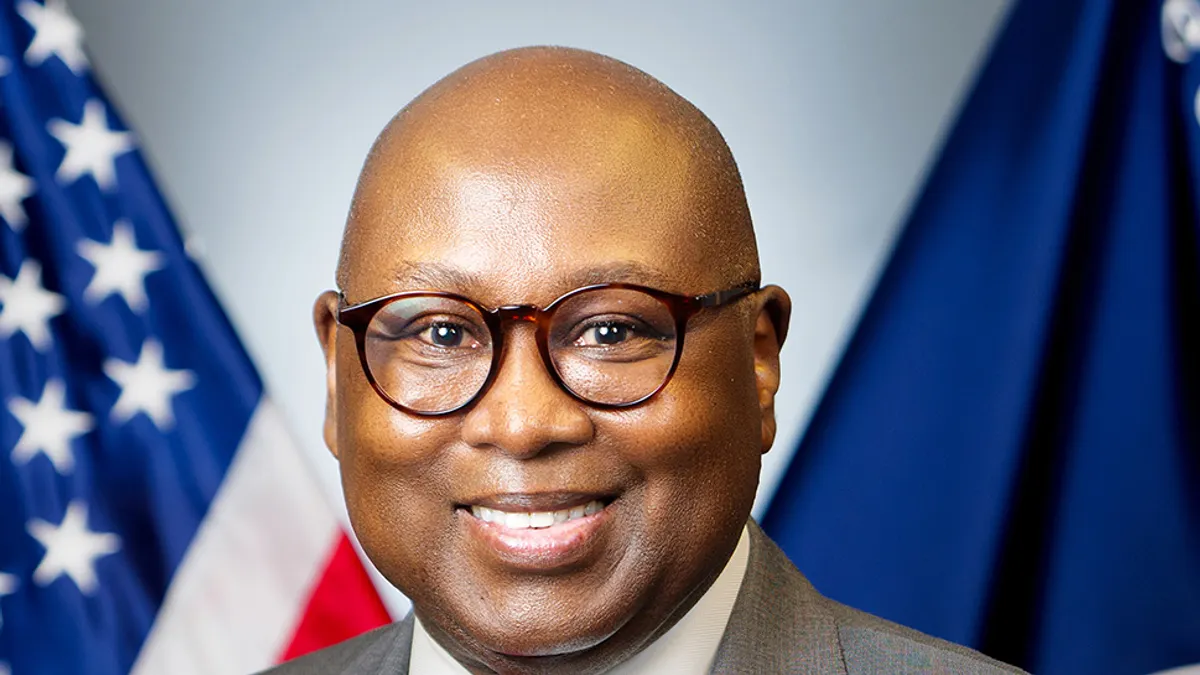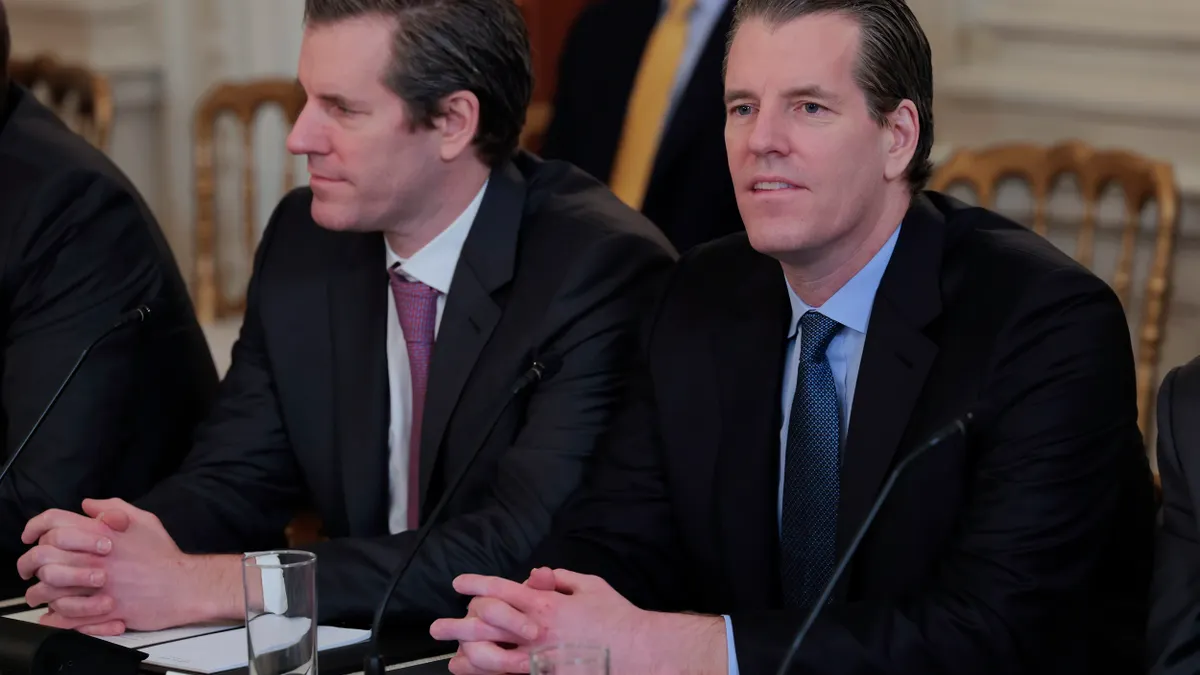Stephen Miran, President Donald Trump’s most recent nominee to the Federal Reserve’s board of governors, pushed back repeatedly Thursday against suggestions he would cast policy votes tainted by politics.
Independence of monetary policy is a “critical element” to the Federal Reserve’s success, Miran told the Senate Banking Committee at a hearing Thursday.
“The Federal Open Market Committee is an independent group with a monumental task, and I intend to preserve that independence and serve the American people to the best of my ability,” Miran said, referencing the interest rate-setting panel that next votes Sept. 16 and 17.
Trump, presumably, would like to see Miran confirmed before then and cast a vote to lower the interest rate.
Despite Miran’s testimony, Sen. Elizabeth Warren, D-MA, the panel’s ranking member, said she expects Miran would serve as Trump’s “puppet.”
“You have made clear that you will do or say whatever Donald Trump wants you to do or say,” Warren told Miran. “That may work in a political position, but it takes an ax to Fed independence, and will make life far more expensive for American families.”
Some Republican lawmakers, while not criticizing Trump’s efforts to influence the Fed, made it clear they favor keeping the central bank insulated from political interference.
“Are you Donald Trump's puppet?” Sen. John Kennedy, R-LA, asked Miran.
“Not at all,” Miran said. “I'm very independently minded, as shown by my willingness to stray from consensus, and have out-of-consensus views, and I believe that I will continue to be as independent in my thinking process if confirmed.”
“We’re going to hold you to that governor — future governor,” Kennedy said. “You’ve got to call them like you see them.”
Leave of absence
Miran, who now serves as chair of the White House’s Council of Economic Advisers, said he would take a leave of absence from that job to serve a four-month stint at the central bank. Miran is nominated to fill the Fed seat once occupied by former Fed Gov. Adriana Kugler, who resigned in August. The term expires in January.
That prospect prompted pushback from Sen. Andy Kim, D-NJ, who argued Miran “could very well be continuing to act in a way that is in the political interests of the president, because you know he is going to be your future boss again at the White House.
The FOMC has kept the rate steady since Trump retook office – despite amplified pressure from the president.
Trump has relentlessly badgered Fed Chair Jerome Powell over his reluctance to lower rates – to the point, some would argue, of working to force Powell’s resignation over an overbudget renovation. Trump last week attempted to fire another Fed governor, Lisa Cook, over allegations of mortgage fraud. Cook has sued to block her dismissal.
Thursday’s nomination hearing came despite a request from all 11 Democrats on the Senate Banking Committee, who sought to postpone Miran’s testimony until a judge rules on Cook’s status.
“The Senate should not consider any nominee to the Federal Reserve during this unprecedented attempt to undermine its independence,” the senators wrote in a letter Friday to banking panel Chair Tim Scott, R-SC. “The Committee should instead hold an oversight hearing on the legal and economic implications of the President’s actions.”
Miran’s nomination, then, would likely need the support of all 13 of the committee’s Republicans to proceed to the full Senate.
At least one panel Republican, Sen. Thom Tillis of North Carolina, said Wednesday he’s “not going to consider anybody until [Cook’s case has] been adjudicated.”
“I’m going to leave it to the courts to decide whether or not it’s legal,” Tillis told Politico. “If it’s a move to really kind of create a partisan divide in the Fed, then I’m against it on that basis.”
Cook’s lawyers, in a court hearing Friday, argued Trump’s move to dismiss the Fed governor was a pretext to gain a majority on the seven-seat board. Trump’s two current appointees dissented with the FOMC’s July decision not to drop the interest rate. Miran would represent a third Trump pick; Cook’s replacement, pending a court ruling, would be a fourth.
“I have no interest in moves that would make the Fed really come under direct control of the executive branch,” Tillis said in a separate interview.
’Groupthink’
Miran last year co-wrote a 24-page proposal accusing the Fed of “groupthink that has led to significant monetary-policy errors while allowing the Fed the flexibility to unwisely expand its remit into inherently political areas such as credit rationing and banking regulation.”
Miran proposed limiting the central bank to a monetary policy focus and prohibiting Fed governors from serving in the executive branch for four years after the end of their term.
“Short-circuiting the revolving door between the Fed and the executive branch is critical to reducing the incentives for officials to act in the short-term political interests of the president,” he wrote, alongside Dan Katz, now chief of staff at the Treasury Department.
Miran and Katz also argued for shorter terms for Fed governors and greater White House control to dismiss central bank appointees.
In testimony Thursday, Miran said Congress “wisely tasked the Fed with pursuing price stability, maximum employment and moderate long-term interest rates.”
“If confirmed, I will transparently and honestly work toward that pursuit, with the goal of preserving a stable and healthy economy that benefits all Americans,” he said.
Miran did, however, opine that the Fed’s “operations expand well beyond this scope.”
At its core, the “most important job of the central bank is to prevent depressions and hyperinflations,” Miran said.
Trump’s two Fed appointees, Gov. Christopher Waller and Vice Chair for Supervision Michelle Bowman, espoused, in their July dissent, that Trump’s tariffs would create a one-time impact on prices rather than a long-term one. Powell, meanwhile, has been more cautious of the long-term effect.
Miran, for his part, has been a vocal critic of Powell, particularly post-COVID.
“Powell was wrong politically and economically when he urged Congress to ‘go big’ on fiscal stimulus in October of 2020,” Miran wrote on social media last September. “We know what happened next.”
— Jim Tyson contributed to this report.




















